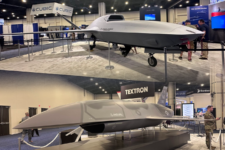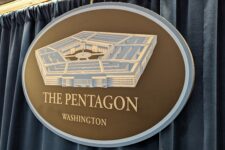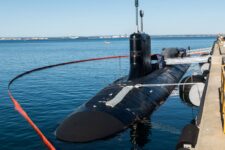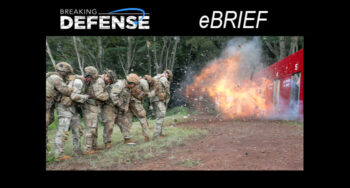 [updated Tuesday 1/29 with Rep. Forbes’ recommendations & McKeon selections for QDR independent panel] WASHINGTON: It’s that time again. Though delayed by the still-unsettled strife over sequestration and the continuing resolution, deep inside the Pentagon the ponderous machinery of the Quadrennial Defense Review is gearing up. But this may be the QDR’s last chance.
[updated Tuesday 1/29 with Rep. Forbes’ recommendations & McKeon selections for QDR independent panel] WASHINGTON: It’s that time again. Though delayed by the still-unsettled strife over sequestration and the continuing resolution, deep inside the Pentagon the ponderous machinery of the Quadrennial Defense Review is gearing up. But this may be the QDR’s last chance.
With the war winding down, the budget tightening, and new threats on the rise, there’s a crying need for strategic insight. If, at such a moment, the 2014 QDR and the accompanying Congressionally appointed panel are as unproductive as their predecessors, there are growing grumbles among Congressional Republicans to kill the review process altogether.
“Congress sees the 2014 QDR as a make or break strategy,” said the American Enterprise Institute’s Mackenzie Eaglen, a former Hill staffer herself and one of the GOP’s favorite pundits. She recently started a QDR working group that has had heard from both Republican legislators and Pentagon officials. (Eaglen also writes regularly for this site as a member of the Breaking Defense Board of Contributors).
“If DoD screws this up,” Eaglen told Breaking Defense, “and it follows the broken processes of past QDRs, the Hill will throw it out and rewrite Title X” – the section of the US Code that governs the Defense Department in general and the QDR in particular. “I’d say that it is a general sentiment that members are willing to scrap the QDR and either start over or replace it with something else if this one fails as they’ve perceived the last several have.”
How strong is the sentiment to kill the QDR? “Well, Sydney, first of all, I have heard people make that suggestion,” said Rep. Randy Forbes, the new chairman of the seapower panel on the House Armed Services Committee, in a phone call with Breaking Defense. “I’m not one of those people, yet.”
“I prefer to say we can fix it. We can make it work,” Forbes went on. “I think the QDR is a valuable tool for us to have… if we just get back to the basics.”
“The QDR was designed to be quite a bit different than what it has actually morphed to,” he said. “[Instead of] a fresh look at our national defense to make sure that we had the right strategy…unfortunately it has become much more of a rubber stamp to justify and approve existing strategies.” Today, Forbes said, “when for the most part budget is driving our strategy instead of strategy driving our budget, it’s important that the QDR once again do what it was meant to do.”
Even the top Marine assigned to the QDR process acknowledged its frustrations and limitations. “In the actual congressional language that mandates the QDR, it’s supposed to be a 20-year look into the future, it’s supposed to be a strategy document that takes a long range look,” said Maj. Gen. Kenneth McKenzie, speaking at the Stimson Center earlier this week. “In fact, it never has. It typically has a much shorter time horizon.”
The predecessors to the current QDR process, the 1990 Base Force study and the 1993 Bottom Up Review, reshaped the post-Cold War military into the form it still largely holds, even after 9/11, McKenzie said – but “the four QDRs since then, to varying degrees, I would argue have been less consequential.”
Again and again, budget constraints have overshadowed strategy. It’s especially hard to look out two decades when you don’t know how much money you have this year. So the current QDR, due to Congress in 2014, is already behind schedule. “There is probably some work underway at OSD [the Office of the Secretary of Defense], but we really don’t have the terms of reference fleshed out,” said McKenzie. “We’re going to wait ’til March and see what happens with sequestration, with continuing resolution, with the debt ceiling” – and with the new Secretary of Defense (presumably Chuck Hagel).
“The new Secretary is going to come in with ideas and the QDR is going to respond,” McKenzie emphasized. “It is the Secretary’s report.” The QDR’s relevance, he said, depends “on the degree to which the incoming Secretary of Defense treats it as one of the tools he’s going to have to reshape the department.”
The law poses particular questions but gives each Secretary wide discretion in how to go about answering them. “The manner in which DoD does it is up to the Sec. of Defense,” said one House Armed Services Committee staffer. “The Congress didn’t dictate this enormous bureaucratic process.”
That then-Secretary Robert Gates largely bypassed the QDR process when he made sweeping program cuts is one of the GOP’s abiding complaints. “The 2010 QDR was irrelevant and useless the moment it was issued,” said Eaglen.
The GOP’s chief outlet for its frustration, to date, has been Congressionally appointed panels to monitor the QDR process and produce their own reports in parallel: the influential National Defense Panel in 1997-1998, the less successful QDR Independent Panel in 2010, and a new National Defense Panel created in the 2013 National Defense Authorization Act whose members are yet to be named. Democratic legislators agreed to form the panels and get to nominate half their members – but it’s worth noting that Congress never authorized such a shadow QDR during a Republican administration.
“We don’t necessary see it as a partisan sort of thing,” objected one GOP staffer. “We’re not singling out the Obama administration and saying they haven’t done a good job at this. This has just become the culture with the QDR, where we’re missing that strategic framework, [for] several successive administrations, both Republican and Democrat.”
“There was a sense of frustration,” the staffer went on, “[that] there’s not a justification [or] a strategic framework for a lot of these things we’re supposed to be voting on.”
The 2010 Independent Panel got started only after the Pentagon’s QDR process had begun, and it never quite caught up. Nevertheless, it made several recommendations well-received by Republicans and by Rep. Forbes in particular, including a call for a military build-up in the Pacific – two years before Obama made that a centerpiece of his strategy – centered around a Navy of 346 ships, far larger than the current fleet of less than 300.
“That was a sea change,” said Forbes. “[But] the part about starting too late and being under-resourced, I fully agree with.” The 2012 NDAA addresses some of those weaknesses with the 2010 independent commission. “With the changes we’ve made, they’ll be able to start a year out, which is going to be hugely beneficial,” Forbes said. “[And] we’re reducing that number of people down from 18 to ten” – two named by the Secretary of Defense, four by the Senate Armed Services Committee, four by the HASC – “which I think is a much more workable group.”
“It’s going to be important that we get the right mix of people on that panel,” Forbes added, saying he would be sending a list of names to HASC chairman Buck McKeon soon.
[UPDATED: Forbes formally sent his recommendations to McKeon and other top authorizers on Monday. They include Reagan’s Navy Secretary, John Lehman, father of the V-22; former Senators Jim Talent and John Kyl; and three of “our rising generation of distinguished national security thinkers”: Thomas Mahnken of the Naval War College; Bryan McGrath, a retired Navy captain and former Romney advisor; and Shawn Brimley, a former Obama Administration official now at the Center for a New American Security. Click here for Forbes’s full letter].
[UPDATED: On Tuesday, Chairman McKeon announced his two picks for the panel: Sen Talent and Ambassador Eric Edelman, a career civil servant now on the board of the Atlantic Council. HASC’s ranking Democrat Adam Smith, Senate Armed Services Committee chairman Carl Levin and ranking member James Inhofe, and Defense Secretary Panetta will also each nominate two members, for a total of 10].
Ultimately, though, the biggest driver for a relevant QDR is not the kind of panel Congress appoints, nor even the stance the Secretary takes, but just how bad the current fiscal situation has become. It’s easy for the service bureaucracies to logroll a lowest-common-denominator defense of all their favorite programs in times of plenty. Nowadays, however, with even the Army and Marines taking occasional potshots at each other, let alone the Army, Navy, and Air Force, fiscal constraint may force some illuminating disagreements.
“There is some concern/fear in the Pentagon that because the QDR will take place in the midst of budget declines and the ‘pivot’ toward Asia, it will break the preexisting pattern and result in a serious debate over strategy and resources,” one longtime and well-connected observer of the QDR process wrote in an email to Breaking Defense. “Well, maybe a bit of wishful thinking here. But ends of wars, reduced budgets, and strategy shifts can generate wonderful things.”
And if they don’t? Then maybe it really is time to put the Quadrennial Defense Review out of everybody’s misery.
Defense industry could see big shakeup under Trump: 2025 Preview
President Donald Trump had a hands-on approach with the defense industry during his first administration. This time? Don’t rule it out.


























